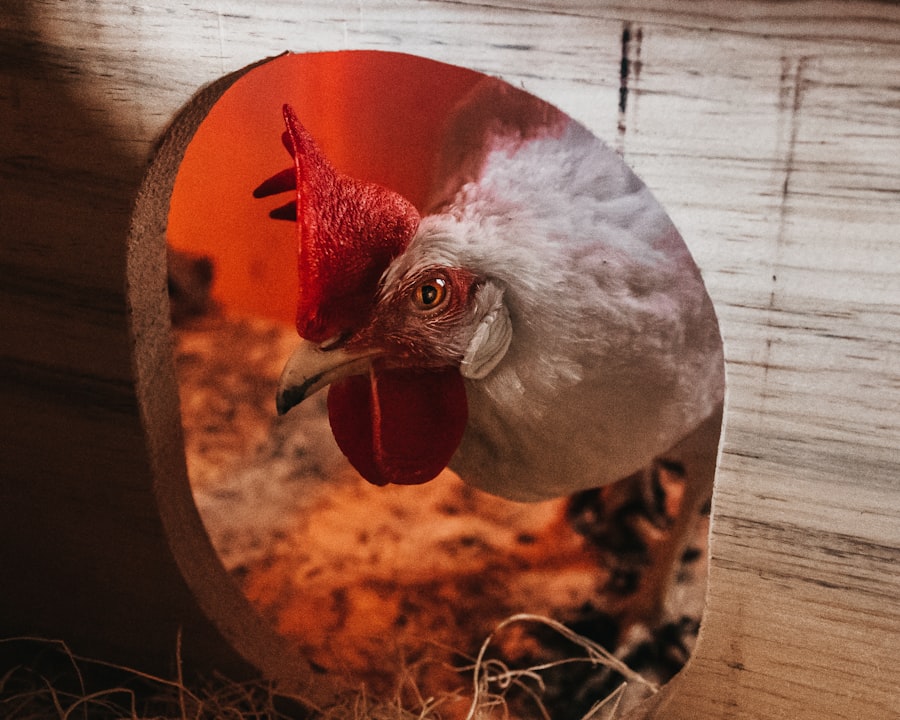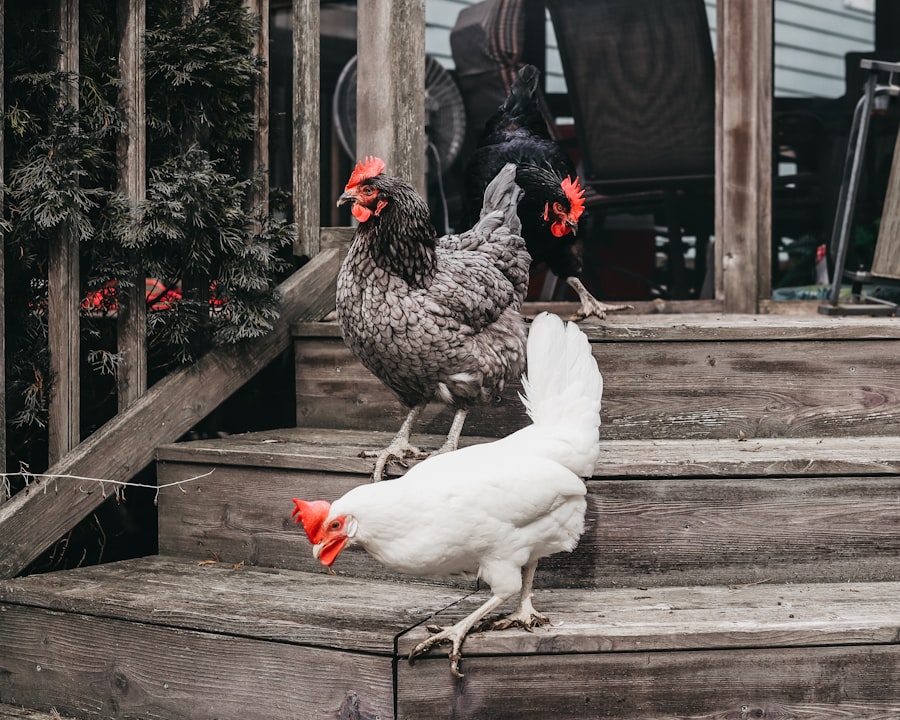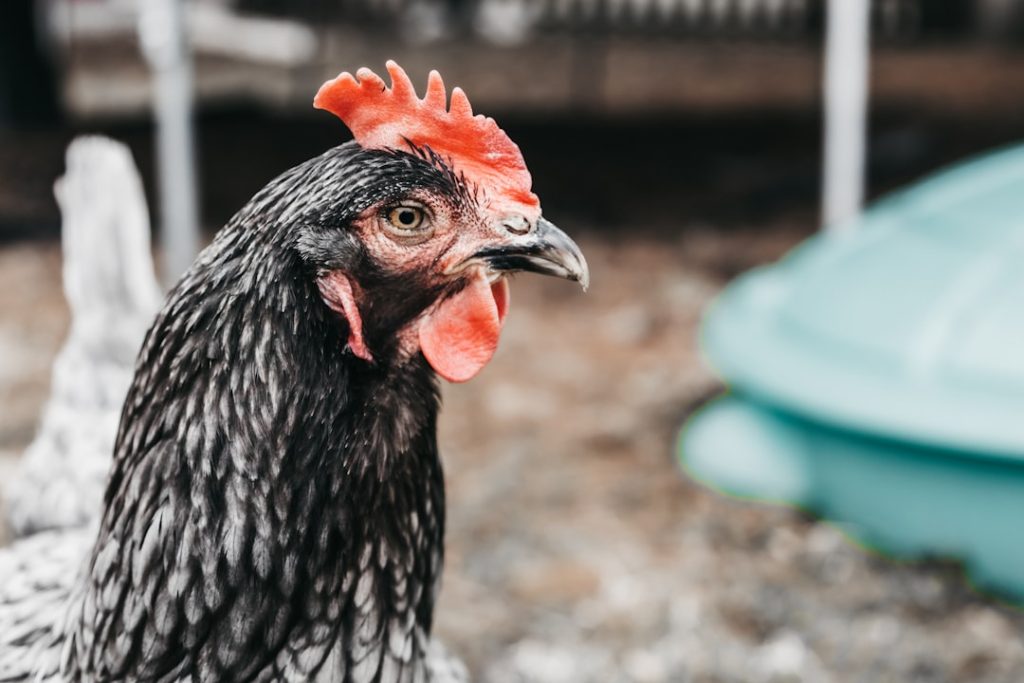Proper coop design and maintenance are essential for the health and well-being of chickens. A well-designed coop should provide adequate space, allocating 2-3 square feet per bird. Effective insulation is necessary to regulate temperature, keeping chickens warm in winter and cool in summer.
The coop should include roosting bars for nighttime perching, nesting boxes for egg-laying, and a secure door to protect against predators. Regular maintenance is crucial for the coop’s longevity and the chickens’ health. This involves inspecting for signs of wear and tear, such as rotting wood or rusting metal, and promptly repairing or replacing damaged components.
Keeping the coop clean and free of debris is important to prevent pest infestations and potential health issues for the chickens. By implementing proper coop design and maintaining it regularly, chicken owners can create a safe, comfortable environment that promotes the health and productivity of their flock. These practices help ensure that chickens have a suitable habitat in which to thrive, supporting their overall well-being and egg production.
Table of Contents
- 1 Regular Cleaning and Bedding Changes
- 2 Adequate Ventilation
- 3 Proper Waste Management
- 4 Use of Natural Odor Control Methods
- 5 Regular Pest Control
- 6 Regular Health Checks and Maintenance
- 7 FAQs
- 7.1 What are some tips for keeping a chicken run clean and smell free?
- 7.2 How often should chicken droppings be removed from the run?
- 7.3 What type of bedding is best for keeping a chicken run clean?
- 7.4 How can proper ventilation help keep a chicken run clean and smell free?
- 7.5 What are some cleaning products that can be used in a chicken run?
Key Takeaways
- Proper coop design and maintenance is essential for the health and safety of your poultry.
- Regular cleaning and bedding changes are necessary to prevent the buildup of bacteria and parasites.
- Adequate ventilation is crucial to ensure good air quality and prevent respiratory issues in the flock.
- Proper waste management is important to prevent the spread of disease and maintain a clean environment.
- Using natural odor control methods can help keep the coop smelling fresh without the use of harsh chemicals.
- Regular pest control is necessary to prevent infestations and protect the health of the poultry.
- Regular health checks and maintenance are crucial for identifying and addressing any health issues in the flock.
Regular Cleaning and Bedding Changes
Regular Cleaning is a Must
Regular cleaning and bedding changes are essential for maintaining a healthy coop environment for your chickens. Cleaning the coop regularly helps to remove droppings, feathers, and other debris that can attract pests and lead to health issues for your flock. It’s important to thoroughly clean the coop at least once a week, removing all bedding and scrubbing down the surfaces with a mild detergent.
Choosing the Right Bedding
Bedding should be changed regularly to keep the coop dry and odor-free. Proper bedding is also important for the health of your chickens. Good options include straw, wood shavings, or shredded paper, which provide a comfortable and absorbent surface for the chickens to walk and lay on.
When to Change Bedding
Bedding should be changed whenever it becomes soiled or wet, as this can lead to bacterial growth and unpleasant odors. By maintaining a regular cleaning schedule and changing bedding as needed, you can create a clean and healthy environment for your flock to thrive.
Benefits of Regular Cleaning and Bedding Changes
Cleaning the coop at least once a week helps to remove debris that can attract pests and lead to health issues for your flock. Additionally, changing bedding regularly helps to keep the coop dry and odor-free. By maintaining a regular cleaning schedule and changing bedding as needed, you can create a clean and healthy environment for your flock to thrive.
Adequate Ventilation

Adequate ventilation is crucial for maintaining a healthy coop environment for your chickens. Proper ventilation helps to remove excess moisture, ammonia, and other airborne pollutants that can lead to respiratory issues for your flock. The coop should have windows or vents that can be opened to allow fresh air to circulate, while still providing protection from drafts and predators.
Additionally, it’s important to ensure that the coop is not overcrowded, as this can lead to poor air quality and increased risk of disease. Proper ventilation is essential for maintaining a healthy coop environment for your chickens. The coop should have windows or vents that can be opened to allow fresh air to circulate, while still providing protection from drafts and predators.
Additionally, it’s important to ensure that the coop is not overcrowded, as this can lead to poor air quality and increased risk of disease. By providing adequate ventilation, you can create a clean and healthy environment for your flock to thrive.
Proper Waste Management
Proper waste management is essential for maintaining a healthy coop environment for your chickens. Chicken droppings can quickly accumulate and create an unsanitary environment if not managed properly. It’s important to regularly remove droppings from the coop and dispose of them in a designated area away from the coop.
Additionally, consider composting chicken droppings to create nutrient-rich fertilizer for your garden. In addition to managing chicken droppings, it’s important to properly dispose of any food scraps or other organic waste in a timely manner. This will help to prevent odors and attract pests that can pose a threat to your flock.
By implementing proper waste management practices, you can create a clean and healthy environment for your chickens to thrive.
Use of Natural Odor Control Methods
The use of natural odor control methods can help maintain a pleasant environment in your chicken coop. One effective method is the use of herbs such as lavender, mint, or lemon balm, which can be scattered around the coop to help neutralize odors. Additionally, using natural odor-absorbing materials such as charcoal or baking soda can help keep the coop smelling fresh.
Another natural odor control method is the use of diatomaceous earth, which can be sprinkled in the coop to help absorb moisture and reduce odors. This natural substance is also effective at controlling pests such as mites and lice, making it a valuable addition to your odor control routine. By incorporating natural odor control methods into your regular coop maintenance routine, you can create a more pleasant environment for both you and your flock.
Regular Pest Control

Identifying and Preventing Infestations
Regular inspections of the coop are essential to identify signs of pests and take proactive measures to prevent infestations. A clean and well-maintained coop can help prevent pests from taking hold.
Natural Pest Control Methods
Diatomaceous earth is a natural and effective way to control pests like mites and lice. Sprinkling it in the coop can help eliminate these pests. Additionally, natural pest control methods like neem oil and garlic spray can be used to safely eliminate pests without harming your chickens.
Creating a Safe and Healthy Environment
By implementing regular pest control measures, you can create a safe and healthy environment for your flock to thrive. A healthy coop environment is essential for the well-being of your chickens, and with the right strategies, you can keep your flock happy and healthy.
Regular Health Checks and Maintenance
Regular health checks and maintenance are essential for ensuring the well-being of your flock. It’s important to regularly inspect your chickens for signs of illness or injury, such as lethargy, loss of appetite, or abnormal behavior. Additionally, keeping an eye on egg production and quality can provide valuable insights into the overall health of your flock.
In addition to regular health checks, it’s important to provide proper nutrition and access to clean water at all times. This will help support the overall health and immune function of your chickens, reducing their risk of illness or disease. By implementing regular health checks and maintenance practices, you can ensure the well-being of your flock and address any issues before they become more serious.
This proactive approach will help keep your chickens healthy and thriving for years to come.
If you’re looking for more tips on keeping your chicken coop clean and odor-free, check out this article on using a trampoline in your chicken run. The article discusses how adding a trampoline to your chicken run can help keep the area clean and prevent the buildup of waste. It’s a creative and effective solution for maintaining a healthy and pleasant environment for your chickens. Check it out here!
FAQs
What are some tips for keeping a chicken run clean and smell free?
Some tips for keeping a chicken run clean and smell free include regularly removing droppings, providing proper ventilation, using absorbent bedding, and regularly cleaning feed and water containers.
How often should chicken droppings be removed from the run?
Chicken droppings should be removed from the run at least once a week to prevent buildup and odors.
What type of bedding is best for keeping a chicken run clean?
Pine shavings or straw are good options for bedding in a chicken run as they are absorbent and help control odors.
How can proper ventilation help keep a chicken run clean and smell free?
Proper ventilation helps to reduce moisture and ammonia buildup in the chicken run, which can contribute to odors and unsanitary conditions.
What are some cleaning products that can be used in a chicken run?
Vinegar and water can be used as a natural cleaning solution in a chicken run, as it is effective at killing bacteria and odors. Additionally, there are commercial poultry coop cleaners available for purchase.
Meet Walter, the feathered-friend fanatic of Florida! Nestled in the sunshine state, Walter struts through life with his feathered companions, clucking his way to happiness. With a coop that’s fancier than a five-star hotel, he’s the Don Juan of the chicken world. When he’s not teaching his hens to do the cha-cha, you’ll find him in a heated debate with his prized rooster, Sir Clucks-a-Lot. Walter’s poultry passion is no yolk; he’s the sunny-side-up guy you never knew you needed in your flock of friends!







